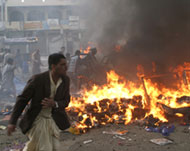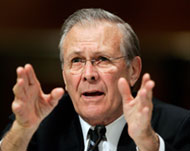Bush urges patience on Iraq
The Bush administration is conveying a stay-the-course message on the third anniversary of the US-led invasion of Iraq, although a top military commander has acknowledged that the armed anti-US campaign is fiercer than expected.

George Bush, the US president, set the tone for his administration when he said on Sunday: “We are implementing a strategy that will lead to victory in Iraq.”
Dick Cheney, the vice-president, and Donald Rumsfeld, the secretary of defence, echoed the remarks.
“The Iraqi people voted for democracy last December; 75% of the eligible citizens went to the polls. Now, the Iraqi leaders are working together to enact a government that reflects the will of the people,” the president said at a time when polls at the US are indicating growing public scepticism about the mission.
Rumsfeld, writing in a column for The Washington Post newspaper, declared: “Now is the time for resolve, not retreat. Turning our backs on postwar Iraq today would be the modern equivalent of handing postwar Germany back to the Nazis.”
Progress hailed
Cheney echoed the president in hailing political progress in Iraq, noting that the Iraqis had met political deadlines set for them and predicting they would form a unified government “shortly”.
In an interview on CBS Face the Nation, Cheney rejected a statement in which Iraq’s former interim prime minister said the increasing attacks could only be described as a civil war.
“If this is not civil war, then God knows what civil war is,” Iyad Allawi told the BBC.
 |
|
There has been a surge in the |
Instead, Cheney described the violence as the actions of terrorists who had “reached a stage of desperation”.
“What we’ve seen is a serious effort by them to foment a civil war,” Cheney said. “But I don’t think they’ve been successful.”
Yet, there were acknowledgments from US General George Casey that the situation is fragile and that he was not in a position to predict the strength of the armed anti-US campaign.
“I did not think it would be as robust as it has been,” Casey, the top commander there, said on NBC’s Meet the Press programme. “And it’s something that, obviously, with my time here on the ground, my thinking on that has gained much greater clarity and insight.”
Bush did not mention the continuing attacks, the car bombings or the mounting Iraqi deaths in his two-minute statement to reporters. And he avoided using the word “war”, choosing instead to call the day “the third anniversary of the beginning of the liberation of Iraq”.
Sacrifices
The president indirectly referred to the violence when he said he spent the morning reflecting on the sacrifices made by US soldiers.
Bush said he spoke by phone earlier in the day with the US ambassador to Iraq, Zalmay Khalilzad, and had received a positive report.
 |
|
Rumsfeld: Now is the time for |
More than 2300 US servicemen and women have been killed in Iraq.
The White House is trying to remind the disapproving public of Bush’s vision for Iraq with a public-relations blitz.
The president plans to give a series of speeches on Iraq, beginning on Monday in Cleveland.
More than three-fourths of the public thinks that Iraq is probably heading towards civil war, according to an AP-Ipsos poll taken in early March.
And two-thirds of Americans say the US is losing ground in preventing civil war in Iraq, according to a Pew Research Center poll taken in the same period. That is up from 48% in January.